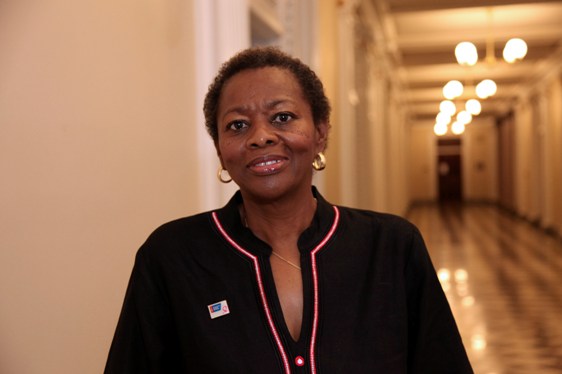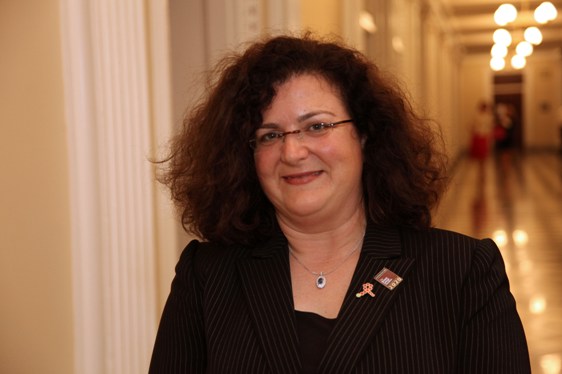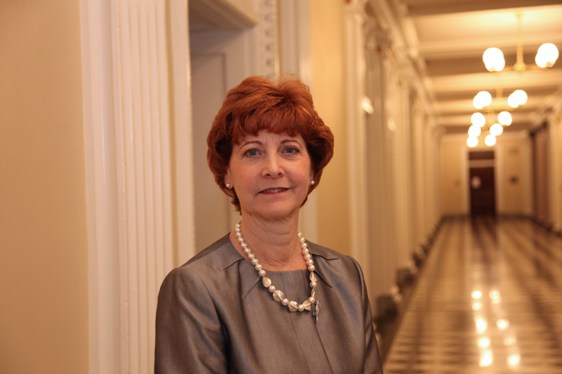Champions of Change Blog
"I Have Cancer, But Cancer Doesn’t Have Me"
Posted by on October 10, 2011 at 1:03 PM EDTEd. Note: Champions of Change is a weekly initiative to highlight Americans who are making an impact in their communities and helping our country rise to meet the many challenges of the 21st century.
I believe in the saying that if you give to the world the best you have, the best will come back to you. I have tried to live my life inspired by this mantra—and I have tried to inspire and influence others to do the same. My fight against breast cancer and my work to educate and help others facing the same challenge have defined my life for the past four years. My volunteer work in building stronger communities in Washington, DC and in my home state of North Carolina has been my passion for over thirty years. And while the impact of my efforts alone may be limited, I believe those efforts have been greatly magnified by the efforts of countless volunteers who have responded to my positive example and found ways to serve their communities in countless ways.
My dream of visiting the White House was realized when the American Cancer Society Cancer Action Network nominated me as a Champions of Change, in recognition of my work helping to fight against breast cancer. When I was diagnosed in June 2007 with a rare form of breast cancer, my world and my life perspective changed drastically. The harsh treatments—chemotherapy, surgery and seven weeks of radiation—took a toll on me, changing the very essence of who I am and limiting my abilities to accomplish some of my dreams. Now, I am a breast cancer survivor, certified breast health educator, community navigator, youth worker, and Ambassador for the American Cancer Society Cancer Action Network.
A major lesson I learned along the way was the value of family members, friends, communities, and colleagues--they provide identity, support, joy and comfort. They make the fight against this disease tolerable. No one who travels the breast cancer journey should have to make this journey alone.
Almost from the inception of my diagnosis, I vowed to fight back and use my voice to increase funding for cancer research and to make it a national priority. I have vowed to use my experience as a survivor as a beacon of hope and inspiration for others who have the disease or who have lost a loved one.
Today, I serve as a community navigator for Smith Center for Healing and the Arts, where I regularly navigate 18-20 patients, providing moral support and a listening ear. I help arrange mammography appointments, connect patients with financial and housing resources, and identify other needs, such as transportation, lack of education, and fear about the disease.
Yes, I have cancer, but cancer doesn’t have me. I have a voice and a story that can help inspire and give hope to others who are fighting the disease.
Thelma Jones is a four-year breast cancer survivor who is a relentless cancer advocate and certified breast health educator for the American Cancer Society (ACS) and community navigator for Smith Center for Healing and the Arts.
Learn more about Health Care, WomenLooking Forward: There's More Work to Be Done
Posted by on October 10, 2011 at 8:38 AM EDTEd. Note: Champions of Change is a weekly initiative to highlight Americans who are making an impact in their communities and helping our country rise to meet the many challenges of the 21st century.
It’s an honor to be recognized as a Champion of Change in the breast cancer community. I’m truly humbled to be in the company of so many other amazing advocates working to change the status quo for women affected by breast cancer. The September 27th roundtable discussion at the White House began in agreement that it is very important that everyone have access to quality healthcare. I am so proud of the work done by the National Breast Cancer Coalition (NBCC) and members of The Young Survival Coalition, (YSC)—one among many of NBCC’s grassroots member organizations—to support the Affordable Care Act. We look forward to the full implementation of that Act.
The roundtable also exchanged intriguing thoughts about how we truly measure success in breast cancer. Not all cancers are created equal. Some are slow growing and easily treatable. Others can appear suddenly in late stages, are very aggressive and not very responsive to current therapies. We are very good at screening for and diagnosing early stage, slow growing cancers, but how do we improve the status quo for women diagnosed with the more aggressive late stage disease?
Sharing Hope for a Cure
Posted by on October 7, 2011 at 7:23 PM EDTEd. Note: Champions of Change is a weekly initiative to highlight Americans who are making an impact in their communities and helping our country rise to meet the many challenges of the 21st century.
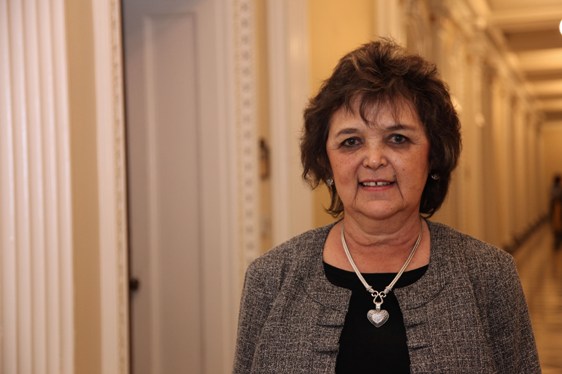
I volunteer in Nevada for The American Cancer Society Cancer Action Network (ACS CAN), the advocacy affiliate of the American Cancer Society. I volunteered for the American Cancer Society for 12 years following my breast cancer diagnosis to educate others about the importance of early detection. I wanted to share the hope that the American Cancer Society showed me when I was first diagnosed.
As part of my advocacy work this past year in Nevada, we have met with 46 of our 64 Nevada legislators and advocacy volunteers from all three of Nevada’s Congressional districts meet with their respective lawmakers. These face-to-face meetings are critical to the work we do advocating to increased cancer research funding to find cures and new treatments for breast cancer.
In 1983, I was diagnosed with breast cancer and the treatment was a mastectomy. I survived due to early detection. In 1999, I was diagnosed with Chronic Lymphocytic Leukemia, for which there is no cure. I have been on a clinical trial for 12 years in an effort to find a cure for myself and others with the same type of cancer. I am alive due to cancer research.
Working with Congress is vital to securing important cancer research funds for the future, so that we can bring hope to all the women and families that are touched by this terrible disease.
Delia Oliveri was diagnosed with breast cancer in 1983 and underwent a mastectomy. She credits early detection with saving her life and volunteered for the American Cancer Society for 12 years following her diagnosis to educate others about the importance of early detection, including serving as the only Spanish speaking volunteer in her area.
Learn more about WomenDedication to Affecting Real Change
Posted by on October 7, 2011 at 4:00 PM EDTEd. Note: Champions of Change is a weekly initiative to highlight Americans who are making an impact in their communities and helping our country rise to meet the many challenges of the 21st century.
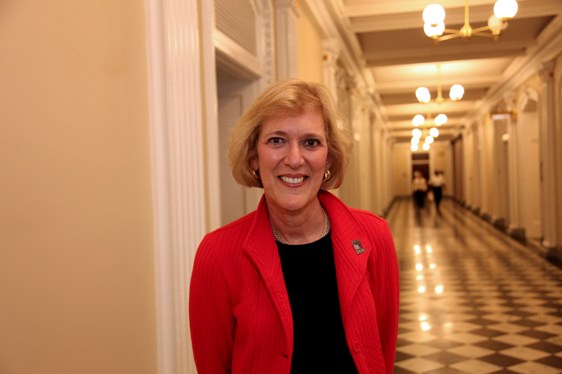
Sitting around in a circle with 14 other Champions of Change, I am overwhelmed by the intense passion surrounding me, the commitment of each one of the champions towards a common goal of finding a cure for breast cancer.
The women on the dais, and all those in the room, have accomplished so much in the fight against breast cancer. We have come a long way but we are not champions, only workers along that path to change.
Passion is not enough. I look at everyone and realize that we desperately need to have a directed, strategic approach towards solving the myriad of problems before us to enable us to reach our common goal.
It all begins in the research lab where careers are based on publications and collaboration is not rewarded. We need to change the incentive system, to break down the silos that separate one institution from another, one specialized field from another, and promote cross fertilization so that we can better focus our limited funding resources.
Advocating for Equal Breast Cancer Care Everywhere
Posted by on October 7, 2011 at 1:45 PM EDTEd. Note: Champions of Change is a weekly initiative to highlight Americans who are making an impact in their communities and helping our country rise to meet the many challenges of the 21st century.
The Champions of Change program is testament to the impact that one person can have in improving our world. As I listened to the other Champions in the fight against breast cancer, I was struck by the passion and dedication we all have for this important battle. I am inspired by Ambassador Nancy Brinker, whose promise to her dying sister Susan has grown into the world’s largest grassroots movement in the fight against breast cancer, Susan G. Komen for the Cure. I am proud to be a part of this organization that has provided $1.9 billion for breast cancer research and supported every significant advance in breast cancer treatment since 1982.
Our challenge today is to ensure that every woman has access to screening and to continue the translational research that can deliver the cure. Even though the survival rate for breast cancer detected early has increased from 74% to 98% in the past 30 years, not every woman gets regular mammograms. The CDC reported last year that only 75% of women who should have had a mammogram reported having one in the prior two years. Among women with insurance, only 50% reported getting regular mammograms. The barriers are many---economics, access to screening facilities, education, language, transportation, and fear. As the Affordable Care Act expands access, there should be a parallel push to expand utilization. This is also something all advocates can do---promote screening and early detection among your families, friends, coworkers, and communities. You never know if the woman you convince to get a mammogram will have her life saved as a result.
Giving Back by Giving Hope
Posted by on October 7, 2011 at 11:21 AM EDTEd. Note: Champions of Change is a weekly initiative to highlight Americans who are making an impact in their communities and helping our country rise to meet the many challenges of the 21st century.
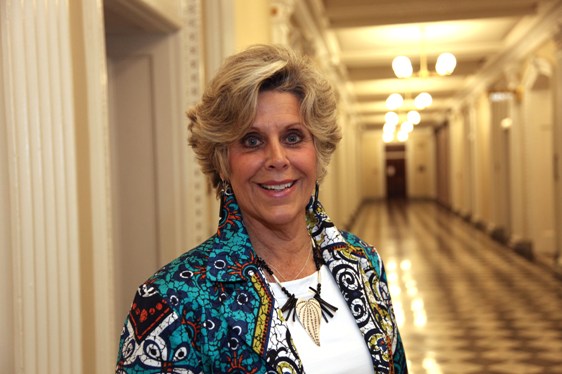
I am a 3 time cancer survivor, 2 times with breast and 1 with colorectal. My breast cancer of 29 years ago resulted in several surgeries and double mastectomies. My diagnosis has led me to volunteer work that has greatly impacted my life. I am a mother of 4 and grandmother of 12. My experience has led me to become a breast cancer advocate to help others with their battle.
I volunteer with the American Cancer Society and the American Cancer Society Cancer Action Network because it is my way of giving back. I feel very blessed with my recoveries and want to be able to give back and help others look beyond their fear of cancer and pull out their courage to fight the battle and win it. I feel that it is extremely important to promote our message of prevention and early detection. I like to offer others hope, so they can go forward on their cancer journey with trust, confidence and belief in themselves.
Last year, I had my second diagnosis of breast cancer. I did not have insurance at this time and was able to qualitfy for the Breast and Cervical Cancer Program, funded by CDC. Thanks to ACS CAN, I was able to utilize my information through them and escape financial devastation. I am able to help others with this knowledge and help advocate for the continued funding for this program.
- &lsaquo previous
- …
- 152
- 153
- 154
- 155
- 156
- 157
- 158
- 159
- 160
- …
- next &rsaquo
White House Blogs
- The White House Blog
- Middle Class Task Force
- Council of Economic Advisers
- Council on Environmental Quality
- Council on Women and Girls
- Office of Intergovernmental Affairs
- Office of Management and Budget
- Office of Public Engagement
- Office of Science & Tech Policy
- Office of Urban Affairs
- Open Government
- Faith and Neighborhood Partnerships
- Social Innovation and Civic Participation
- US Trade Representative
- Office National Drug Control Policy
categories
- AIDS Policy
- Alaska
- Blueprint for an America Built to Last
- Budget
- Civil Rights
- Defense
- Disabilities
- Economy
- Education
- Energy and Environment
- Equal Pay
- Ethics
- Faith Based
- Fiscal Responsibility
- Foreign Policy
- Grab Bag
- Health Care
- Homeland Security
- Immigration
- Innovation Fellows
- Inside the White House
- Middle Class Security
- Open Government
- Poverty
- Rural
- Seniors and Social Security
- Service
- Social Innovation
- State of the Union
- Taxes
- Technology
- Urban Policy
- Veterans
- Violence Prevention
- White House Internships
- Women
- Working Families
- Additional Issues

